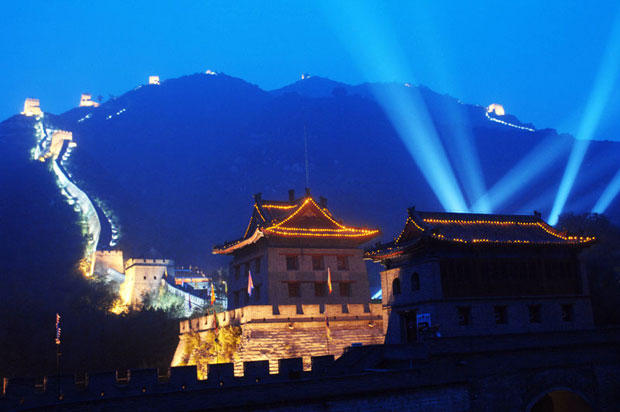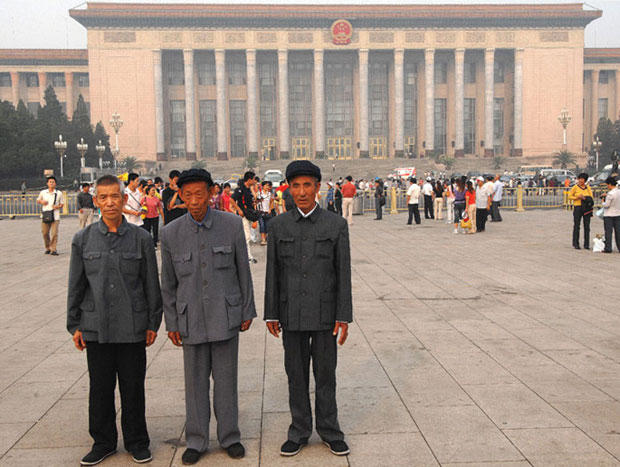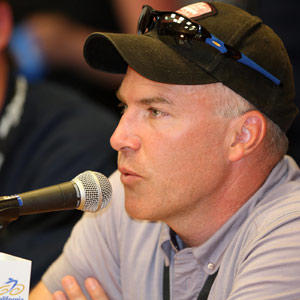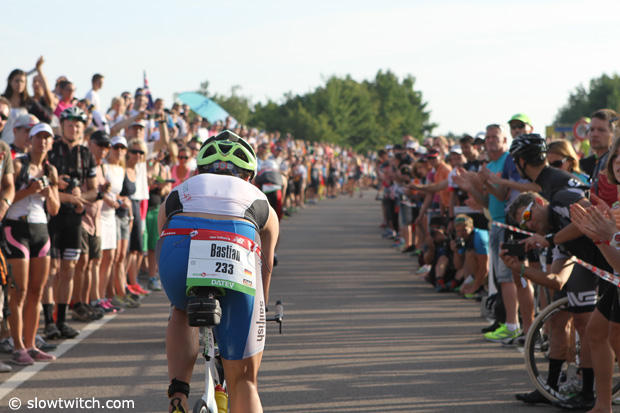Ironman a Chinese mega-brand?
A couple of months ago I came very close to smearing digital egg all over my face. I was prepared to write that it's clear and obvious to anyone with eyes that Life Time Fitness's new parent company, private equity firm Leonard Green, was going to buy Ironman. It just did not make sense to me that Life Time and Ironman were into each others' businesses so tightly unless it was a prelude to joint ownership. The final straw was a perfunctory listing of real estate deals in Greater Boulder that had Life Time and Ironman each signing leases in the same building.
But unless we're witnessing one of the great business head fakes of all time I would've been spectacularly wrong. It's not that Life Time's Bahram Akradi wouldn't like to own Ironman; and when Leonard Green took Life Time private I thought Mr. Akradi's reinvestment of $125 million of his own money into the deal was his skin-in-the-game gesture giving Leonard Green the confidence to buy Ironman.

And it might still happen, but first Chinese firm Dalian Wanda would need to beg off purchasing Ironman. It is in negotiations to buy it right now and this one might be for real.
Ironman's owner, private equity firm Providence Equity Partners (PEP), has been shopping Ironman for a year and a half. It hasn't quite been an auction, but it did retain investment banking expertise to help move the brand. Since that time I've heard rumblings that Swiss sports management company Infront as well as French mega sports conglomerate Lagardère were kicking the tires of Ironman. I also heard earlier this year that Life Time was poised to buy Ironman and it had gotten to the point where PEP was poised to, within the week, hand the front door keys over to Mr. Akradi and Leonard Green, so, the wise reader filters all these rumors through the sieve of skepticism.
Still, the Infront rumor becomes interesting for reasons below.
In Sam Wilkin's new book, "Wealth Secrets of the One Percent," he writes: The worst place to do business is really the best – it is easier to dominate emerging markets due to the lack of competition and potential for growth. Dalian Wanda is the largest commercial land developer in China and its owner, Wang Jianlin, was well situated after a 17-year stint in the Chinese army to enter China's entrepreneurial Wild West. Today he's in a tie with Alibaba's Jack Ma as the richest man in China, with shopping centers in 100 Chinese cities.
Dalian Wanda has already invested in brands and properties outside of China. It owns the U.S.-based chain AMC Theaters and a similar theater chain in Australia, which Dalian Wanda also purchased from a private equity firm. These two chains plus the largest chain of theaters in China make Dalian Wanda the largest theater owner in the world, and it intends to build its own movie studio as well.
Dalian Wanda owns Sunseeker, the British maker of luxury yachts featured in at least four James Bond Movies released since 1999. And, as of 6 months ago, it owns Infront, the Swiss company mentioned above (purchased in February, 2015).
Infront was not simply interested in purchasing Ironman if the rumors were true, it already had a relationship with Ironman. Since 2011 Infront has been the key marketing partner for Ironman in Europe and South Africa. Could Infront be the agency of intersection, introducing Dalian Wanda to Ironman? I don't know.

What could be the reason Wang Jianlin wants Ironman? Dalian Wanda's interest in sport is evidence by its purchase of a 20 percent interest in Spain's professional soccer team Atletico Madrid. Infront has close ties with FIFA; indeed Infront's CEO is Philippe Blatter, nephew of Sepp Blatter, the president of FIFA from 1998 until his resignation in June, 2015. Mr. Wang has a strong interest in soccer, sponsoring Chinese teams and players, sending them to Spain for soccer training and Spanish educations. The younger Mr. Blatter is one likely nexus point in this deal: His pedigree and background might be soccer, but his passion is triathlon. He's a 15-time Ironman finisher, just having finished Ironman Switzerland.
If Dalian Wanda ends up owning the Ironman it seems likely that Ironman's Australasian expansion will continue. Oceania and Asia is, along with Latin America, Ironman's largest growth market over the last two or three years. It would be pretty easy to get course permits, closed roads and abated costs if you're the largest commercial developer and real estate manager in a host city.
When it became apparent that PEP was seeking to divest itself of Ironman the obvious interested buyers were sports and talent management companies, like IMG and CAA, as well as those entities specifically sport-oriented, like the ASO or Infront. I mentioned them all when I wrote about Ironman's recapitalization exactly one year ago. Taken in that light Dalian Wanda is all of that. It owns Infront, which is a sports and media company, and Dalian Wanda was already an entertainment company.
Is the deal itself, a rumored $850 million sale price, sound? Obviously Dalian Wanda is not reticent to purchase a property from a private equity firm. Ironman's EBITDA (earnings on operations) is rumored to be in the $50 million range and that sounds right, because it projected north of $40 million in EBITDA in last year's prospectus. This would make the sale price of Ironman somewhere between 15 and 20 times EBITDA and that's a tall multiple. But Dalian Wanda paid 12x for Infront, and Ironman's growth in both top and bottom line outstrips Infront's growth over the past three years.
Some think Ironman might've topped out, that it hosts about as many races in North America and Europe as the sport can absorb, that PEP is selling Ironman at the top of its arc. Maybe that's true, maybe not. Even if that's close to true in developed markets, one just imagines the possibilities if Ironman takes off in China the way it has in Taiwan, the Philippines, Singapore and elsewhere. Who is better placed than Dalian Wanda to make that happen? This would be congruent with Dalian Wanda's core business, which is its big wager than an emerging Chinese middle class will generate disposable income. Shopping centers, movie theaters, and mass participation sporting events are what you patronize when you finally have a little money left over after housing and food.
This might cause Ironman enthusiasts to wonder whether such an expansion could siphon Kona slots away from North American and European races, diverting them to Asia. Maybe. But does anyone think Ironman is finished installing new race in new venues? The question is only where those additional venues might be.
What about just the optics and the reality of a Chinese company owning Ironman? Could this be a problem for the Ironman base? Maybe. But if so, the very people objecting to buying entries in a Chinese-owned race are those now racing an American-owned brand in Chinese wetsuits, aboard Chinese bikes and in Chinese running shoes, if by Chinese we refer to the country where all these products are made.
This sale would reverse that paradigm. Instead of an American brand whose products are manufactured in China, Ironman would be a Chinese brand whose "products" are "manufactured" in the U.S., as Dalian Wanda would unquestionably maintain the same Ironman management now in place.



